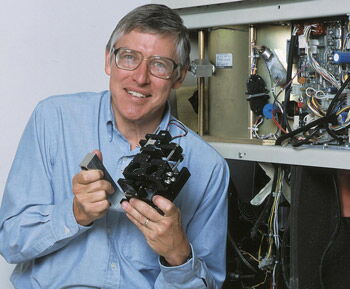Spin control | Centrifuge innovations position a South Berwick biotech company for growth
 Photo/Courtesy University of New Hampshire
Tom Lauer, a molecular biologist at the University of New Hampshire, hold the Centrifugal Fluid Analyzer, his South Berwick company's recently released analytic centrifuge
Photo/Courtesy University of New Hampshire
Tom Lauer, a molecular biologist at the University of New Hampshire, hold the Centrifugal Fluid Analyzer, his South Berwick company's recently released analytic centrifuge
A South Berwick company is preparing to ship its first-of-a-kind centrifuge this fall, a product borne equally of frustration and innovation that could hasten discoveries in the scientific and pharmaceutical industries.
Spin Analytical Inc. is readying its open-source analytic ultracentrifuges for commercial use after two years of development by the company’s founders, Tom Laue and Brett Austin. The device allows scientists and technicians to peer into the characteristics of proteins — an advance needed for drug research and clinical diagnostics, according to Laue.
“The immediate impact will be the availability of a modern analytical ultracentrifuge,” says Laue, a molecular biologist at nearby University of New Hampshire, where he worked with Austin, an engineer. “The capabilities of the new centrifuge will allow advances in an area that has been stymied for 20 years.”
Laue and Austin, plus chief engineer Paul Vachon, research and manufacture instruments for scientific uses. Frustrated by the lack of adaptability of a standard analytical centrifuge, Austin says the team focused its efforts to produce the Centrifugal Fluid Analyzer. The first shipment of the $150,000 instrument goes out in November, with five more orders in the queue.
What makes the CFA different from its competitors, according to Austin, is how the centrifuge produces results.
An analytic ultracentrifuge works like a tiny, top-loading clothes dryer, but with a whirling force 300,000 times gravity. The Spin Analytical centrifuge whips proteins past an optical detector that reveals the profile of each protein in a sample. Protein profiles are associated with complex neurological diseases and cancers, says Austin, so accurate profiles can be used to develop new drugs and make accurate medical diagnosis.
An example: About 80% of prostate tumors grow so slowly the cancers will never harm a patient, but the remaining 20% move quickly, able to metastasize and cause death. The tumors result in unique protein profiles at each stage. Using the CFA, oncologists could receive exact protein profiles from a patient — usually within a couple of hours of taking the sample — then decide on appropriate treatment.
The 60,000-rpm centrifuge uses a unique dye system that can track multiple proteins and return “first principal measurements” on as many as 16 samples in two hours, Austin says, returning conclusions that are “definite rather than subject to interpretations that could be right or wrong.”
He makes the comparison to pregnancy tests, which rely on a sequence of biochemical interactions that can misfire at numerous junctures to produce a false positive.
“The CFA’s biggest advantage is that it uses physics to produce results,” says Austin. “It can pick out individual proteins in a complex solution that could contain as many as 100 proteins. We can tag and track the one protein we’re looking for.”
Austin said initially he expected to market the CFA to pharmaceutical and biochemical researchers, but has now identified three new markets for the product. He declined to identify the new markets, or his customers, to avoid tipping Spin Analytical’s hand to its main competitor, Beckman Coulter Inc., a huge biomedical instrument manufacturer based in California that reported $2.76 billion in sales in 2007.
“They had a monopoly in analytic centrifuges, but didn’t understand customers’ needs,” he says. For example, Beckman Coulter’s products weren’t modified to include mounts for detectors or lights, nor could they use open-source protocols for hardware or software.
“We believe strongly in the open-source platform idea,” says Austin. “We like the idea of building a base and partnering with another company to put detectors on our instrument.”
Jonathan Kingsbury, a staff scientist at Genzyme Corp., a biotechnology company in Boston with $4.6 billion in revenue in 2008 and $750 million in research and development, says there is a growing need for analytic tools like the CFA in the development of new protein therapeutics. “Spin Analytical’s approach will help the biotech industry meet the demanding needs of robust biophysical characterization while providing a flexible open-source framework that will allow the technology to grow with the changing needs of the analyst,” says Kingsbury, who was a graduate student at UNH but has no affiliation with Spin Analytical.
Drug makers, who insisted on confidentiality, provided the money to get the CFA into production, says Austin, after assessing its merit through Spin Analytical’s alpha testing program. Additionally, the company received $27,000 in U.S. Small Business Administration loans in 2007.
Spin Analytical reported $250,000 in revenue last year due to advances on CFA, and from sales of centrifuge accessories such as centerpieces, cell housings, alignment tools, cell washers, torque stands and gaskets, which the company makes in its Portland Street facility.
Austin says depending on the feedback they get from the first CFA customers, the company plans to set up a full-scale manufacturing site next year somewhere along the Maine-New Hampshire seacoast with a starting crew of five to 10 employees.
“There would be some field service technicians, engineers, precision fabricators,” says Austin. The team is waiting until the second half of 2010 to iron out the details of its expansion.
Austin, who worked with Laue as his chief engineer on another project years ago, says developing new instrumentation for research and development “is a very challenging field to be in.”
“Right now, we’re working ‘round the clock, but I’m very optimistic that it will all be worthwhile,” he says.
Jim Kozubeck, a writer based in Portsmouth, N.H., can be reached at editorial@mainebiz.biz.
Spin Analytical Inc.
150 Portland St., South Berwick
President: Brett Austin
Founded: 2006
Employees: Three
Product: High-speed centrifuge and accessories
2008 revenue: $250,000
Contact: (603) 319-4248
www.spinanalytical.com










Comments